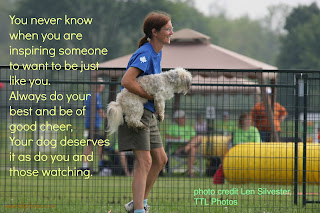There are plenty of instances you might think compliance was critical but it isn't ...
Sam leaping through a guest's open car window to look for a wrapper? Not a big deal. We tell people to roll up windows and give them the reason. If they don't believe us and a large golden leaps through their truck window - so be it.
Thea insisting on lying on a big dog bed so a big dog has to find another spot? Big whoop.
but then there are those other times ....
Like the times enumerated in this blog that Brody has been unhappy to be groomed or when Sally slinks away from a painful eye treatment or won't take a pill no matter the inducement. (you might know how much I dislike the word try - yet here it fits!) If Dora has to suffer a nail trim (we are still working on confident nail trims - never have I had a dog so slow to accept this!) Maybe it's when Sam is offended and barking at the horses because they might steal his stick ... Or, or, or ..... you get the drift .. the perfect dogs aren't always perfect as shocking as that is.
These moments happen in life, no matter who your dog is, what your bar is (some people could live with some of the things I feel are essential to work through - and others probably have a much longer list of problematic behaviours) and no matter how you train.
 But I take comfort from being a positive force-free trainer... so my thinking has to be adaptive, and flexible. The same answer will not work on a soft scared dog as on a dog determined to have agency over whatever. Yelling and screaming are out ... as are striking the dog - I'd like to say obviously ... but there are days that my old nemesis of a hot temper flares deep in my core and I need to stop and breathe for a second or twenty. Then I think and problem solve.
But I take comfort from being a positive force-free trainer... so my thinking has to be adaptive, and flexible. The same answer will not work on a soft scared dog as on a dog determined to have agency over whatever. Yelling and screaming are out ... as are striking the dog - I'd like to say obviously ... but there are days that my old nemesis of a hot temper flares deep in my core and I need to stop and breathe for a second or twenty. Then I think and problem solve.The solution varies and sadly is not always immediately offering the behaviour I want in the way I want.
Brody sometimes simply needs to be held fairly firmly to get groomed. He gets treats and short sessions and all the "right" things but sometimes I have to hold him pretty firmly to trim around his eyes. Sally sometimes is forced to take a pill - I smear peanut butter on the roof of her mouth let her work it for a second then pop the pill in her mouth hold her jaw shut and smooth her throat. Dora gets kid glove treatment .. dogs are cleared (she will redirect frustration on occasion) and I trim nails ... not all of them but more than one ... big meanie that I am. When Sam is leaping around the horses and yelling I walk up to him, ask him to stop and if he can't I snap a leash on him and lead him away. I don't reward him by luring him with a toy or food, nor do I get angry. But I certainly don't allow this unsafe behaviour (for both horse and dog) continue.
None of these things happen often. But they do happen.
Finding the balance point between positive and permissive is not easy, It's personal. But it's important. I am a positive trainer. I work hard to stay a positive trainer. With foresight and planning there are times I will make a management choice that gets something essential accomplished. I think about it hard, plan it carefully and then implement it - along with a training plan to remedy what I can.
(and in the midst of a dog fight, animal attack or any other such thing all bets are off the table - control the anger if you can - but do what you must to end the situation and keep yourself and the animals safe!)










